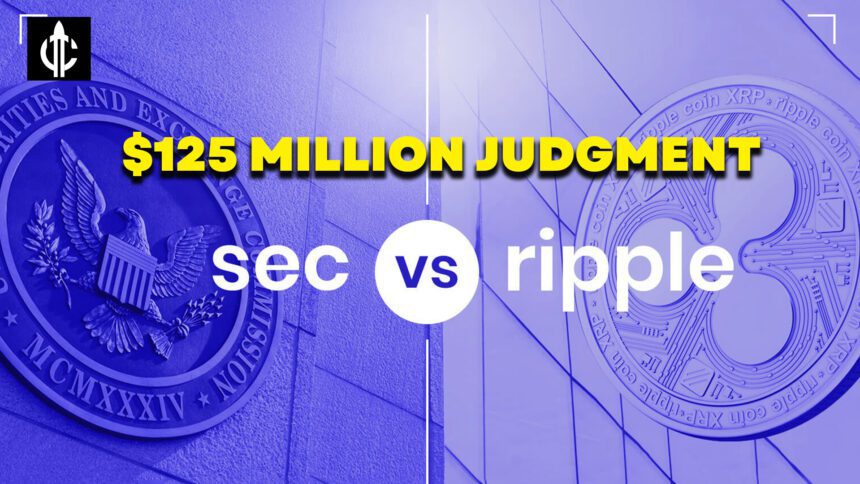The ongoing legal battle between Ripple Labs and the U.S. Securities and Exchange Commission (SEC) has become a focal point in the cryptocurrency industry. The significance of this case extends beyond Ripple itself, as it touches on broader regulatory frameworks for digital assets. Recent trends indicate a growing scrutiny of cryptocurrencies by regulatory bodies, with the SEC’s actions reflecting an attempt to establish clearer guidelines for the industry. As of now, Ripple is navigating a complex legal landscape, having recently secured a stay on a $125 million judgment, which could have far-reaching implications for both the company and the cryptocurrency market.
Section 1: Background of the SEC vs. Ripple Case
The SEC filed a complaint against Ripple Labs in December 2020, alleging that the company raised funds through the sale of XRP, which the SEC classified as an unregistered security. This classification raised significant concerns within the crypto community regarding the regulatory status of various digital assets.
Key Aspects of the Case
- Initial Allegations: The SEC targeted Ripple executives, including CEO Brad Garlinghouse and executive chair Chris Larsen, asserting that they engaged in illegal securities offerings.
- Judicial Rulings: In July 2023, Judge Analisa Torres ruled that XRP was not a security in the context of programmatic sales on exchanges, a decision hailed as a victory for Ripple.
- Current Developments: On August 7, 2024, a judgment was issued requiring Ripple to pay $125 million. However, Ripple’s legal team has since requested a stay on this judgment, indicating potential grounds for an appeal.
Case Study: Ripple’s Market Response
Following the July ruling, the price of XRP experienced a notable uptick, reflecting investor optimism and confidence in Ripple’s legal standing. As of September 5, 2024, XRP was trading at approximately $0.56, having seen a modest increase of 0.15% over the past month.
Section 2: Best Practices for Navigating Regulatory Challenges
As the cryptocurrency landscape evolves, companies must adopt best practices to navigate regulatory challenges effectively. Ripple’s recent actions provide valuable insights into strategies that can be employed.
Strategies for Compliance
- Proactive Engagement: Companies should engage with regulators early and often to understand the evolving legal landscape.
- Transparency in Operations: Maintaining transparency in business practices can help build trust with regulators and the public.
- Legal Preparedness: Having a robust legal strategy in place, including contingency plans for potential litigation, is crucial.
- Stakeholder Communication: Regular updates to stakeholders about legal developments can mitigate uncertainty and maintain investor confidence.
Actionable Tips
- Conduct Regular Compliance Audits: Regularly assess compliance with existing regulations to identify and rectify potential issues.
- Educate Employees: Ensure that all employees are aware of the regulatory environment and the company’s compliance policies.
- Monitor Regulatory Changes: Stay informed about changes in regulations that could impact business operations.
Section 3: Advanced Techniques for Mitigating Legal Risks
In addition to best practices, companies can implement advanced techniques to further mitigate legal risks associated with regulatory scrutiny.
Considerations for Long-Term Strategy
- Diversification of Offerings: By diversifying product offerings, companies can reduce reliance on any single asset, thereby spreading risk.
- Legal Innovation: Explore innovative legal structures that may offer greater protection or compliance with regulations.
- Building Alliances: Collaborate with other industry players to advocate for favorable regulatory frameworks and share best practices.
Implications of Legal Outcomes
The outcome of Ripple’s case could set a precedent for how digital assets are classified and regulated in the U.S. A favorable ruling for Ripple may encourage other companies to push back against regulatory overreach, while an unfavorable outcome could lead to increased scrutiny and compliance costs across the industry.
Conclusion
The legal developments surrounding Ripple and the SEC highlight the complexities of navigating the regulatory landscape in the cryptocurrency industry. As Ripple continues to contest the SEC’s allegations and seeks to stay the judgment, the implications of this case will resonate throughout the crypto market. Companies must remain vigilant, adopting best practices and advanced strategies to mitigate legal risks and ensure compliance.
FAQs
1. What is the SEC’s main allegation against Ripple?
The SEC alleges that Ripple raised funds through the sale of XRP, which it classifies as an unregistered security.
2. What was the outcome of the July 2023 ruling?
Judge Analisa Torres ruled that XRP was not considered a security in the context of programmatic sales on exchanges, marking a significant victory for Ripple.
3. What does the stay on the $125 million judgment mean for Ripple?
The stay allows Ripple to delay payment of the judgment while potentially appealing the decision, providing the company with financial flexibility during the legal process.
4. How can companies prepare for regulatory scrutiny in the cryptocurrency sector?
Companies should engage proactively with regulators, maintain transparency, and have a robust legal strategy to navigate the evolving regulatory landscape effectively.









